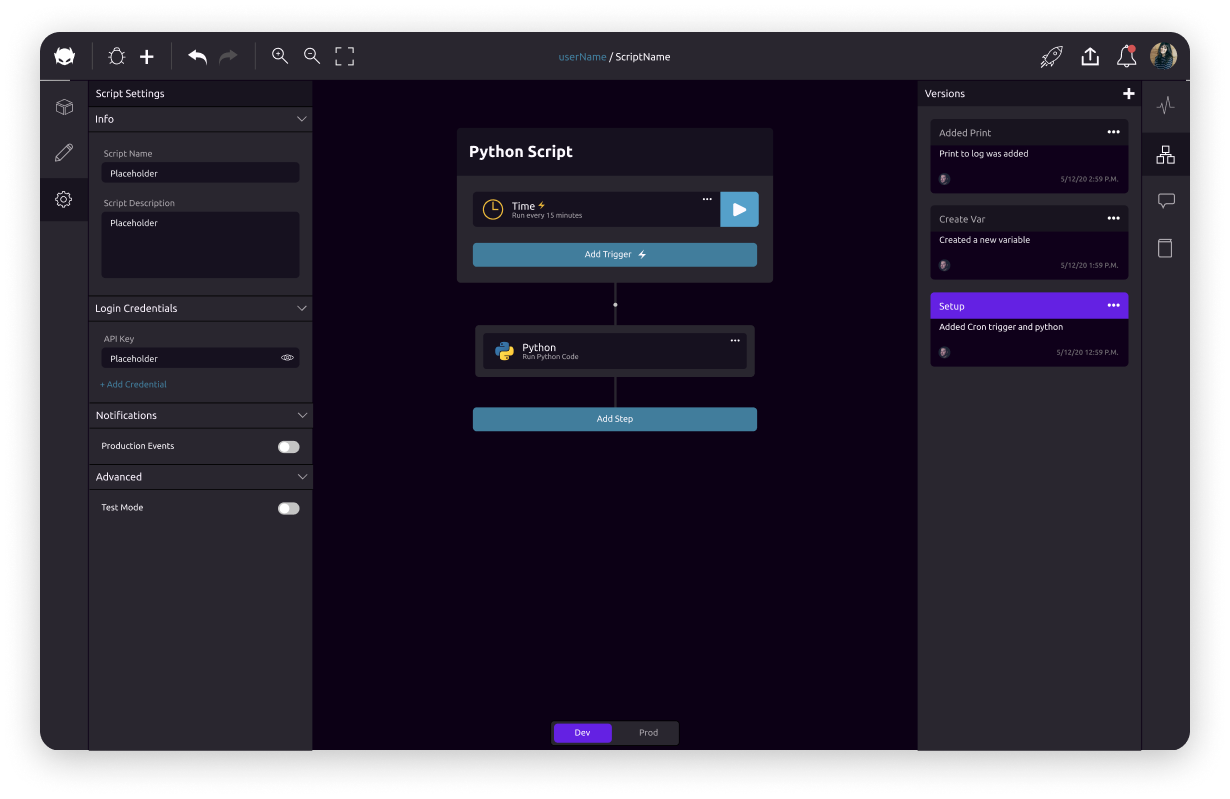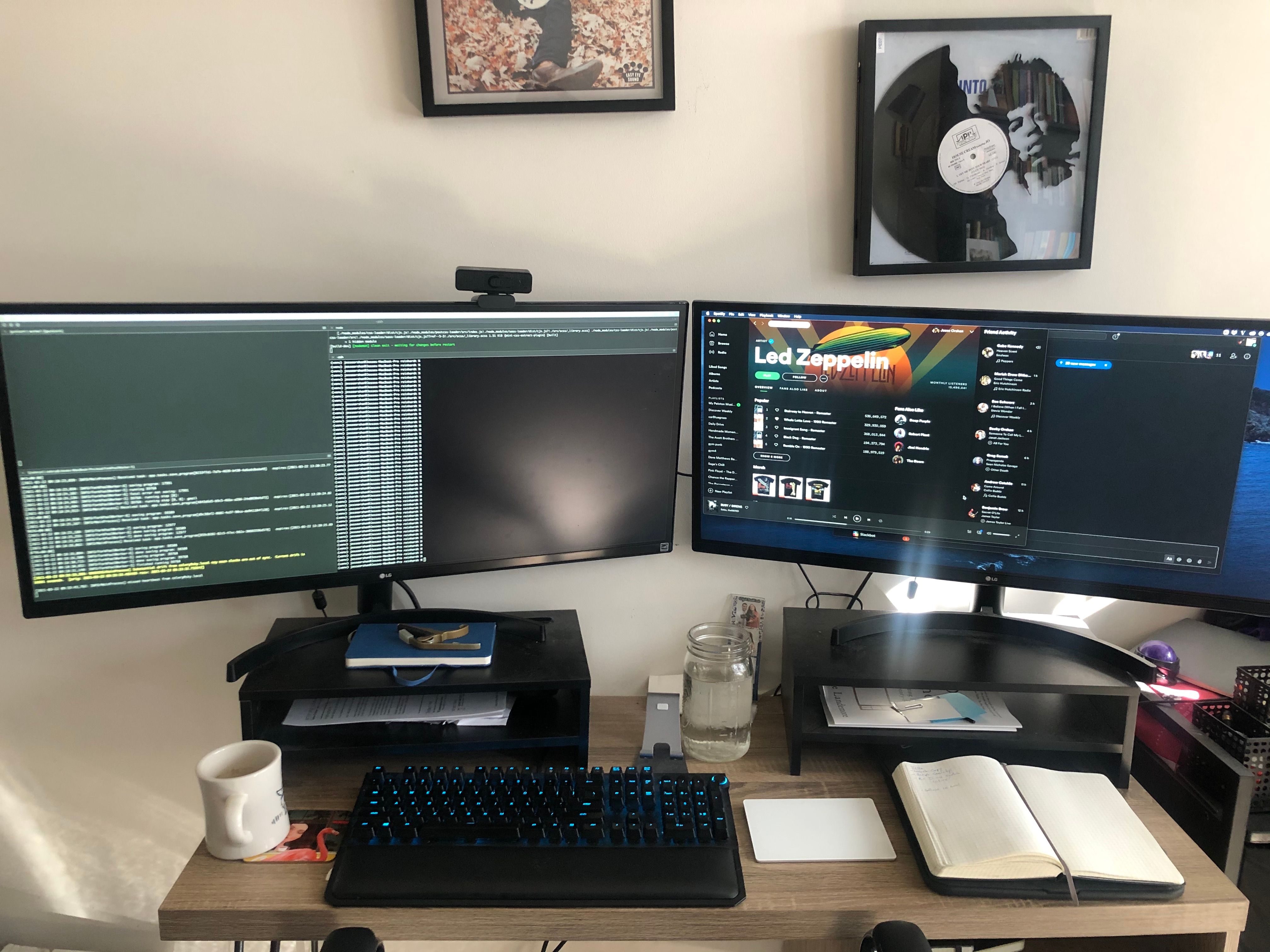Console
Interview with
Jesse Orshan
Co-founder, WayScript
A rapid scripting platform for developers.



What is WayScript? Why did you build it?
WayScript empowers developers to take tools that they want to build and seamlessly turn them into cloud-based production tools.
For example, if you have a Python script that's running on your local machine with inputs through the command line, and you want to turn that into an API, there's a lot of work you have to do beyond the actual problem you're trying to solve.
My co-founder and I both came from programming backgrounds in different industries but we had both spent a lot of time building internal scripts and tools. We were building automations, scripts and dashboards. There's a lot of added complexity that comes through turning that into a production tool.
A simple example is a Python script with command line options. If I wanted to turn that into a tool that another person in the company could use, suddenly I have to provision a server, build an interface, actually build the server endpoints and elements, set up a database for credential management and other types of things.
Not to mention monitoring, logging, reliability, redundancy, security... It's so heavyweight for what we were trying to do where really you just want this thing to execute seamlessly in a cloud environment.
My co-founder and I thought that there should be a platform that's just dedicated to making that easy for developers. WayScript gives you a virtual code space where you can put your files, repository or code, and then seamlessly turn them into tools that are executing in a production cloud environment without any real work at all. This allows developers to focus on the core logic of what they're trying to solve.
For example, event based triggering. You can create a Salesforce or Slack trigger, a cron timer, or HTTP endpoints, and say "When a user hits this endpoint, execute the script." Data from the different components can be injected directly into your code. You get an isolated virtual code space that you can put files into, execute scripts, generate files and folders, and move things around. It is a flexible environment that's meant to feel very much like a localhost environment, but running in production without having to change the way your code works.
You could have data scientists who are using PyTorch and generating massive data sets and files that are presenting on the system, and you could have IT people who are building SQL automations based on events that are happening in the database, DevOps people that are triggering remediation or scripts based on alerting from S3 or AWS or Datadog. You can all do that in the same environment.
The goal of WayScript is we can create uniformity and cohesiveness, no matter what the developer is actually doing.

The WayScript visual programming interface.
What does a "day in the life" look like?
For a long time at the company I was writing a lot of code. My co-founder Lane and I are both software engineers. We recently raised funding and are now growing our team, so are now involved in more high level activities like recruiting, product strategy and roadmap planning. A lot of my time is spent interacting with our engineering teams and talking to our customers.
We are hiring, so if there is anyone interested in joining our team, they should get in touch.
What's your approach to engaging the developer community?
We're very community driven and focused. We believe holistically in the notion that if you build a product that developers love that really solves real pain points for them, it will naturally grow within those communities. When developers find tools that they love that work and solve problems for them, they tend to not only stick with them and use them a lot, but they also preach about them too.
There is a whole new world now, everything from YouTube and Twitch to Udacity. Lots of developers are not going to school to learn, they're learning through these channels, and that is an amazing thing.
The democratization of that skill and accessibility of that kind of knowledge is a really wonderful thing. It's a powerful medium, actually getting instructions, seeing how they're working and the thought process of the developer who's actually building something in front of you.
There are a lot of visual elements to WayScript itself, so it lends itself well to that kind of platform. Our philosophy is that visual and low-code elements are good when they help save time, but bad if they get in your way. We try to strike a balance.
What does the team structure look like?
We're still a small team. It's very engineering-heavy, as you'd expect, because we're building a developer tool. We have all experienced the pains of setting up servers and doing these types of things that are just horrible. This is great as it creates a lot of passion to build a tool we love to use.
The team is front-end engineering, backend engineering, design, and we've just brought on a product manager. We also have a technical writer who's putting out tutorials about how the system works.
We've very much taken an intentional stance of trying to build relationships with the end developers who are using our products. We have a very active Discord forum where we're constantly talking to our users. We also put out content in tutorials on YouTube, and do live demos every other week where we answer questions live. We are trying to be super-accessible to developers who are using the platform.
We have talented people on our team who are the reason that this has gotten as far as it has.
How did you first get into software development?
I started when I went to college. I play guitar and thought I was going to be a musician. I fortuitously fell into starting a company building software for guitar players. It was a company called Thinkplay. That was my first introduction into software development. I started with the goal of solving a problem, which I think is a really great way to learn software development
Python was my first really serious language. Some of the early stuff that I was learning was around digital signal processing and audio stuff, given the nature of my first company.
In the world of learning web tools, I also learned databases and front-end development along with JavaScript and things like that. The exciting part has always been thinking through how to solve the problems and challenges and then trying to pick the language that works best for that.
What's the most interesting challenge you've faced working on WayScript?
We're building a system that is very flexible in terms of the type of tools that are being built on top of it. As a result, we're constantly debating around customizability versus accessibility and ease of use. For example, you can configure things through just ticking a few checkboxes for an HTTP endpoint, but then you can pass variables directly to a Python script and write your own code - those are two very different UX problems.
We've adopted philosophies and frameworks for how we approach those problems. Thinking through holistically how to create a user-friendly experience that hits a large percentage of the use cases, but still creates mechanisms by which somebody can get under the hood and customise if they need to.
Building a system of interconnectivity for all these different data types was a core technical challenge that we faced, and something I think we've done really well. We're continuing to add more and more functionality around this.
For example, we're working on a command line tool where you can pull files down, work on them in a local editor and then throw them back up. This is very similar to a Git or a command line deployment experience. Trying to build a web app like this, it's meaty, for sure.
Of course there are other challenges around event management and detailing with many different connecting components, even some polling (we try and avoid it), but it all ultimately comes down to UX.
We are product-first, then code to make that product experience.
What is the WayScript tech stack?
Our back-end is Python running on AWS. We use a variety of tools for queue and task management. We use Docker for sandboxing and other technologies for queue management. For the front-end, we mainly use React these days. When we started we were writing vanilla JavaScript for most of the interface, but as our team has grown and we've become more sophisticated, we ported over to React, which was a good decision.
What is the most interesting tech you are playing around with at the moment?
We've been using a product called Linear for our task management, which has been awesome. Our team has grown so quickly with venture funding, and this tool has really helped us stay organized.
We've also been using Figma a lot for UX interaction design. It is inspiring seeing what these companies are pulling off in browser environments, blurring the line between application and website.
Describe your computer hardware setup

It's super basic. I have a MacBook Pro laptop with two widescreen LG monitors. I have one specifically for code, and the other one is for emails and things like that. Then I have a Razer Blackwidow Elite mechanical gaming keyboard for coding. We used to joke all the time (pre-COVID-19), that we had the world's loudest office because you'd just hear the clacking of everybody coding. In the general environment, I have two dogs that hang out with me throughout the day while I'm working.
Describe your computer software setup
OS: macOS, Catalina.
Browser: Chrome.
Email: Gmail.
Chat: Slack internally, Discord for users.
IDE: I use Sublime and iTerm. I would be remiss not to shout out that my co-founder, Lane, is a hardcore Vim advocate. He loves Vim.
What about your desk setup? Do you have anything fancy, desk or chair?
Nothing fancy. As we continue to be more remote, I'm probably going to upgrade at some point to a standing desk, but right now, it is still a product of throwing things together based on COVID.
When coding
Daytime or nighttime? Morning.
Tea or coffee? Coffee.
Silence or music? Music.
What non-tech activities do you like to do?
I love playing music. I'm also a big reader, and particularly like sci-fi, though I've recently been reading a lot of history books. I'm a big dog person too. I have two dogs, and I like going on walks with my dogs and things like that.
Find out more
WayScript is a rapid scripting platform for developers. It was featured as an "Interesting Tool" in the Console Newsletter on 25 Mar 2021. This interview was conducted on 18 Mar 2021.
Subscribe to the weekly Console newsletter
An email digest of the best tools and beta releases for developers. Every Thursday. See the latest email